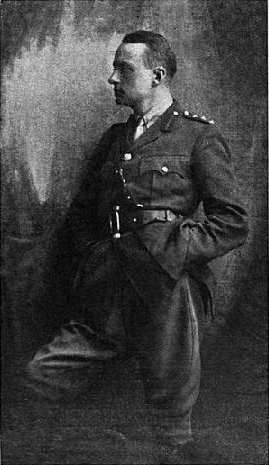Edward Knoblock

| Edward Knoblock | |
|---|---|
| Born |
Edward Gustav Knoblauch April 7, 1874 New York City, New York, U.S.A |
| Died |
July 19, 1945 (aged 71) London, England, U.K. |
| Occupation | Playwright and Author |
Edward Knoblock (born Edward Gustav Knoblauch; April 7, 1874 – July 19, 1945) was an American-born British playwright and novelist most remembered for the often revived 1911 play, Kismet.
Knoblock was born in New York City of German parents and was the grandson of the Berlin architect Eduard Knoblauch. He was graduated from Harvard College in 1896, but he spent much of his professional life in Europe, first in France, then in Great Britain. In 1912, his Milestones, written with Arnold Bennett, became a hit at the Royalty Theatre, playing for over 600 performances.
He became a British subject in 1916 during World War I, anglicized the spelling of his name, received a commission as a captain in the British Army and served in the Secret Service Bureau in the Mediterranean, the Balkans, and Greece. In 1917 he bought and subsequently restored the Regency Beach House, Worthing, Sussex. Knoblock was a lifelong collector of Regency style furniture and furnishings and kept much of the celebrated Thomas Hope collection intact. His London bachelor apartment was at The Albany.
Knoblock wrote many screenplays, perhaps the best known being Douglas Fairbanks' Robin Hood (1922), though he was uncredited, and The Three Musketeers (1921).
Plays written by Knoblock alone include The Shulamite (1906),[1] The Faun (1911), Kismet (1911), My Lady's Dress (1914), Marie-Odile (1915), Tiger! Tiger! (1918), and Grand Hotel (1931). Among the novels written by Knoblock are The Ant Heap (1929), The Man With Two Mirrors (1931), The Love Lady (1933), and Inexperience (1941).[2][3]
Knoblock often worked with a collaborator. His plays Milestones (1912), and London Life (1924) were produced with the assistance of Arnold Bennett. His play Speakeasy, written with George Rosener, became a 1929 film of the same name. Similarly, The Good Companions, originally published in 1929 by J. B. Priestley, was dramatized jointly by Knoblock and the author in 1931.[4][5][6]
Edward Knoblock died in July 1945 at the London home of his sister, Gertrude Knoblauch, a well-known sculptor.[6]
Selected filmography
- Knowing Men (1930)
- Red Wagon (1933)
- The Amateur Gentleman (1936)
Sources
- ↑ Leask, Margaret (2012-07-01). Lena Ashwell: Actress, Patriot, Pioneer. Univ of Hertfordshire Press. p. 111ff. ISBN 978-1-907396-75-5.
- ↑ Kismet, and Other Plays. With an Introduction by John Vere (1957)
- ↑ Knoblock, Edward, 1874-1945. Papers: Guide.Houghton Library, Harvard College Library
- ↑ Modern Plays 1951 Arnold Bennett, Edward Knoblock, Alan Alexander Milne, Noel Coward, Robert Cedric Sherriff, William Somerset Maugham
- ↑ George Moore on Parnassus:1988 By George Moore, Helmut E. Gerber, O M. Brack
- 1 2 The New York Times July 20, 1945; pg. 19
Bibliography
- Edward Knoblock, Round the Room: An Autobiography (London: Chapman & Hall, 1939)
References
- Edward Knoblock at the Internet Movie Database
- Edward Knoblock at Internet Broadway Database
- Guide to the Edward Knoblock Papers at Rice University
- Guide to Edward Knoblock Papers at Houghton Library, Harvard College